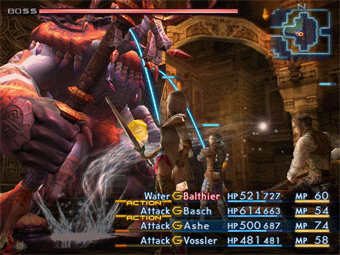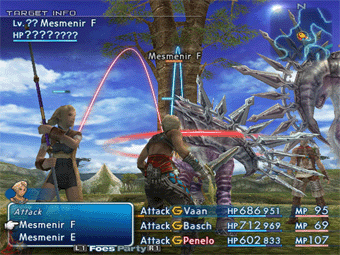This is it. It’s been nearly three years since the last major installment of the single-player Final Fantasy franchise shut its doors, and fans of the game, hell, fans of the genre, have been thirsting for this title. I picked my copy up at a midnight release party at Gamestop—nearly 50 people attended, a considerable number in costume, and all this in a one-horse town like Tucson, Arizona. Similar gatherings in Los Angeles and New York drew hundreds—G4 even did a special on the release from such a party.
People are fanatical about this game, myself included.
The Japanese videogame press couldn’t say enough about FFXII. It was the multiple orgasm videogame they’d been waiting for—it was showered with praise and perfect 10s (or perfect 40s—go figure). The American press has drooled all over it as well: 9s and up as far as the eye can see. Examining FFXII as a standalone game I don’t disagree; exploring it as a Final Fantasy game is a different story.
Let’s get the givens out of the way. The FMV is gorgeous. Mind-blowingly so. Some of the cutscenes are truly masterpieces of electronic entertainment cinema, with voice acting, graphics and musical score weaving a tapestry that’s magnificent to behold. The settings are rendered very nicely, and there’s a lot of personality visually defined in the characters. One thing FFXII does do rather bluntly is demonstrate that the PS2 is yesterday’s news. It’s obviously hitting a wall with this game; there are a number of texture and distance-draw issues that crop up occasionally to demonstrate just that.
The sound is quite good, but not exceptional. While the musical score is fantastic and really adds punch to nearly every facet of the game, the sounds of battle are about what one would expect—clanging, explosions, grunts, cries of pain…no new ground is broken here. Environment sound in Rabanastre (the protagonist’s home town) is really impressive, with background noise, murmurs, music and other little bites of audio that lend a lot of flavor to the setting. This is a trend that continues through fortresses, caverns, sewers and most of the other places Vaan and company dare to tread.
The story is good, but it doesn’t break any new ground. Vaan’s just a street orphan trying to make it in the mean streets of Rabanastre, slugging it out under an oppressive monarchy after his part of the world is conquered by another nation. He just wants what every kid wants—to shake his fist at the man from the wild blue yonder as a sky pirate. His adventures bring him together with Balthier (who is one of the most compelling Final Fantasy characters ever created) and Fran, a pair of sky pirates in their own right. Later he’s joined by another street orphan, Penelo, as well as Basch, a disgraced knight of the prior regime, and Princess Ashe, royalty from said regime. The group has a few ringers that sign on for different parts of the story, but for the most part it’s that core group that lives through FFXII.
Which leads me to my first gripe: Character development is handled through something called a “license board”, which looks like a chessboard with squares missing in the corners. As you win battles, characters earn license points. These points are used to open different squares, unlocking different spells, abilities, proficiency with different weapons and armor, as well as the big limit breaks and summons…wouldn’t be a Final Fantasy game without big, dramatic limit break attacks and the ability to summon huge monsters to kick ass for the good guys.
My problem with the license board is it actually provides too much freedom in character development. Without foreknowledge of exactly how a character will be developed, an understanding of what squares will provide what abilities, and constant bookkeeping of who has what ability, it’s easy to “trap” a character to a point where he becomes a liability. By setting up a character with a skillset that winds up being not all that useful later on in the game, your character becomes almost useless until you go back, fight no end of monsters, earn a whole truckload of license points, and start back near the beginning. It’s frustrating. For this reason alone, I wholeheartedly recommend purchasing the strategy guide alongside the game.
Gameplay reminds me an awful lot of Final Fantasy XI, right down to a lot of the music and the “feel” of the locales. All encounters are visible well before it’s time to throw down; the player has a much greater degree of control for when to fight and when to fly.
Combat is a slight tweak on the ATB (Active Time Battle) system made popular in many previous Final Fantasy titles. It’s faster and allows for character movement in battle, however, and, courtesy of a clever device called the Gambit system, combat micromanagement is a thing of the past. The Gambit system allows you to use a very simple set of prioritized If-Then lines to “program” your allies’ actions. A standard set of gambits for a mage might look like this:
1) If an Ally is down to 50% of his hit points, cast Cure on him.
2) If an Ally dies, use a Phoenix Down to resurrect him.
3) Attack Leader’s Target with equipped weapon
And that’s it—piece of cake. The Gambit system is powerful, easy, and entirely optional; one could control all of the combat actions of each of Vaan’s allies, but why?
As an epic adventure RPG, Final Fantasy XII is fantastic. It’s got a few streaks on the windshield, but otherwise it’s a finely-tuned sportscar of a game, one begging to be driven for days on end. My biggest problem is FFXII doesn’t live up to its pedigree. Final Fantasy VII, VIII, X, Tactics Advance, and the new (or old) FFIII on the Nintendo DS put me in a headlock, crushing my will to play any other game. Final Fantasy XII doesn’t do that. This is a wonderful game, truly a masterpiece of the genre, but it never grabs the gamer by the throat the way its forefathers did. Buy this game, just don’t expect it to challenge for the crown of “Greatest Final Fantasy Game of All Time”.


